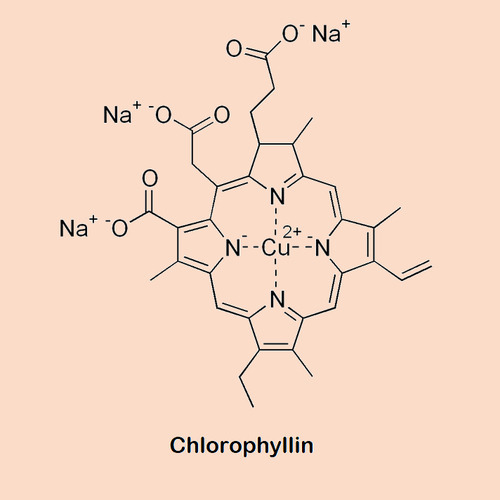
Chlorophyllin
Scientific names: Chlorophyllin
Alternate names: Chloresium, Chlorophylline, Chlorophylline de Cuivre Sodique, Chlorophylline de Sodium et Cuivre, Clorofilina, Sel Cuprique de la Chlorophylle, Sodium Copper Chlorophyll, Sodium Copper Chlorophyllin, Yebaike (YBK)
Background
Chlorophyllin is a chemical that is made from chlorophyll. It is sometimes used as medicine. Due to its green color, it is also used as a coloring for foods.
Chlorophyllin seems to have antioxidant and anti-inflammatory effects. It might also stop the body from absorbing certain chemicals that can increase a person's risk for cancer.
Some people use chlorophyllin for body odor, urinary odor, reducing the smell of bowel movements, bad breath, cancer, acne, and skin wrinkles from sun damage, but there is no good scientific evidence to support these uses.
Chlorophyllin seems to have antioxidant and anti-inflammatory effects. It might also stop the body from absorbing certain chemicals that can increase a person's risk for cancer.
Some people use chlorophyllin for body odor, urinary odor, reducing the smell of bowel movements, bad breath, cancer, acne, and skin wrinkles from sun damage, but there is no good scientific evidence to support these uses.
Safety Safety definitions
When taken by mouth: Chlorophyllin is commonly used in small amounts as a coloring agent in foods. When used in larger doses as medicine, chlorophyllin is possibly safe when taken for up to 3 months. It might make the skin more sensitive to the sun.
There isn't enough reliable information to know if chlorophyllin is safe to use for longer than 3 months. Chlorophyllin contains copper, which can cause serious adverse effects when taken in high doses for an extended period of time.
When applied to the skin: There isn't enough reliable information to know if chlorophyllin is safe. It might make the skin more sensitive to the sun.
Children: There isn't enough reliable information to know if chlorophyllin is safe or what the side effects might be. However, chlorophyllin supplements contain copper. Consuming high doses of copper for an extended period of time can cause serious adverse effects. Use with caution.
There isn't enough reliable information to know if chlorophyllin is safe to use for longer than 3 months. Chlorophyllin contains copper, which can cause serious adverse effects when taken in high doses for an extended period of time.
When applied to the skin: There isn't enough reliable information to know if chlorophyllin is safe. It might make the skin more sensitive to the sun.
Special Precautions & Warnings:
Pregnancy and breast-feeding: There isn't enough reliable information to know if chlorophyllin is safe to use when pregnant or breast-feeding. Stay on the safe side and avoid use.Children: There isn't enough reliable information to know if chlorophyllin is safe or what the side effects might be. However, chlorophyllin supplements contain copper. Consuming high doses of copper for an extended period of time can cause serious adverse effects. Use with caution.
Effectiveness
NatMed Pro rates effectiveness based on scientific evidence according to the following scale: Effective, Likely Effective, Possibly Effective, Possibly Ineffective, Likely Ineffective, Ineffective, and Insufficient Evidence to Rate.
Possibly ineffective Effectiveness definitions
- Urinary odor. Research shows that taking chlorophyllin by mouth doesn't reduce urinary odor in older adults who have a urinary catheter.
Dosing & administration
There isn't enough reliable information to know what an appropriate dose of chlorophyllin might be. Keep in mind that natural products are not always necessarily safe and dosages can be important. Be sure to follow relevant directions on product labels and consult a healthcare professional before using.
Interactions with pharmaceuticals
Medications that increase sensitivity to sunlight (Photosensitizing drugs)
Interaction Rating=Moderate Be cautious with this combination.
Some medications might make the skin more sensitive to sunlight. Chlorophyllin might also make the skin more sensitive to sunlight. Using these products together might increase the risk of sunburn, blistering, or rashes when the skin is exposed to sunlight. Be sure to wear sunblock and protective clothing when spending time in the sun.
Interactions with herbs & supplements
Herbs that might increase sensitivity to sunlight: Chlorophyllin might make the skin more sensitive to sunlight. Using it with other products that also make the skin more sensitive to the sun might increase the risk for sunburn and other side effects. Examples of supplements with this effect include bishop's weed, khella, and St. John's wort.
Interactions with foods
There are no known interactions with foods.
vital.ly has licensed monographs from TRC Healthcare.
This monograph was last reviewed on 19/02/2024 11:00:00 and last updated on 24/12/2012 22:45:18. Monographs are reviewed and/or updated multiple times per month and at least once per year.
Natural Medicines disclaims any responsibility related to medical consequences of using any medical product. Effort is made to ensure that the information contained in this monograph is accurate at the time it was published. Consumers and medical professionals who consult this monograph are cautioned that any medical or product related decision is the sole responsibility of the consumer and/or the health care professional. A legal License Agreement sets limitations on downloading, storing, or printing content from this Database. No reproduction of this monograph or any content from this Database is permitted without written permission from the publisher. It is unlawful to download, store, or distribute content from this site.




